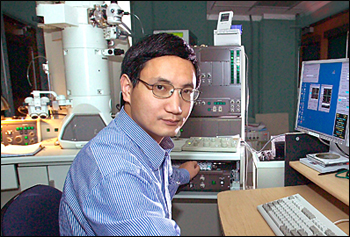Huilin Li Receives Tenure
October 10, 2008
Brookhaven Science Associates (BSA) granted tenure effective August 1 to five Brookhaven scientists: Michael Blaskiewicz, Collider-Accelerator Department (C-AD); Jamie Dunlop, Physics Department; Alexei Fedotov, C-AD; Etsuko Fujita, Chemistry Department; and Huilin Li, Biology Department. Tenure appointments are granted by action of the BSA Board after a rigorous selection procedure overseen by the BSA Science & Technology Steering Committee. In making tenure decisions, the BSA Board is advised by members of the Brookhaven Council, an elected body that advises the Director on matters affecting the scientific staff. This is the fifth in a series of profiles.

Huilin Li
Huilin Li, a biophysicist in the Biology Department, received tenure for his research on the structure and function of molecular complexes that are important to life processes, especially through the use of cryo-electron microscopy. This type of microscopy, in which the sample is frozen to minus 300 degrees Fahrenheit to preserve its molecular structure, is particularly effective for the study of large protein assemblies.
"Huilin Li has established external collaborations with several outstanding researchers to determine the structures of complexes that are important to DNA replication, bacterial infection, and neurological degeneration," said Biology Chair Carl Anderson. "Also, he has developed some valuable new techniques for analyzing molecular complexes in response to DOE's needs."
In 2004, Li, with researchers from BNL and Stony Brook University (SBU), determined the two-dimensional crystal structure of a membrane protein, called PapC, which is involved in the assembly of hair-like projections called pili on E. Coli bacteria. These pili allow the bacteria to invade cells lining the bladder and kidneys, causing infections. This year, Li and his collaborators further revealed the structure of the entire pili assembly machinery. This research might facilitate developing new strategies for prevention and treatment of urinary tract infections.
In 2006, Li and his collaborators published the first detailed reports on the biochemistry and structure of a protein-cleaving complex known as the proteasome that was isolated from the bacterium that causes tuberculosis (TB). The bacterium relies on the proteasome to survive in its mammalian host. Finding a way to inhibit the activity of the bacterial proteasome might lead to an effective treatment for TB.
After Li earned a Ph.D. in electron microscopy and crystal structure from the University of Science and Technology in Beijing, China, he joined DOE's Lawrence Berkeley National Laboratory as a postdoctoral fellow in 1994. He became a scientist in Berkeley's Life Sciences Division in 1998. In 2002, he joined BNL as an associate biophysicist and was promoted to biophysicist in 2005. Since 2003, Li has also been a faculty member at SBU.
2008-899 | INT/EXT | Newsroom









